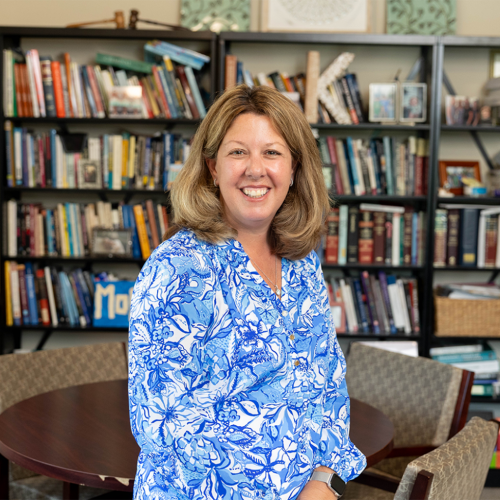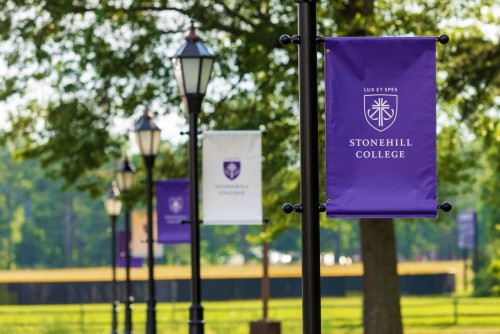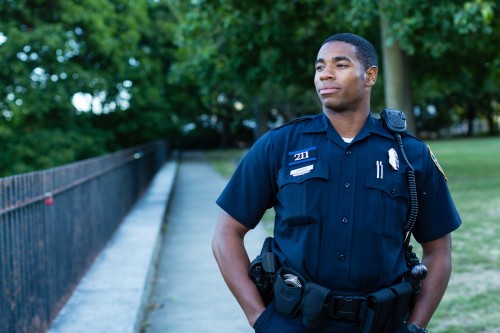Connected Criminology Faculty Help Open Many Doors
Curriculum and breadth of faculty experience position students for success in law enforcement, law school, corporations and the federal government.
Every college student knows that connections matter. But when criminology major Jasmine Santos ’22 went for an interview for her first post-grad job, she did not expect her interviewer to look at her resume and pull out his phone.
“He knew Stonehill, and he told me that Stonehill’s reputation made me stand out,” Santos said. “We realized he knew one of my previous professors. He took his phone out right in the interview and called him on the spot, while I was sitting right there!”
It was a chance happening but not a complete surprise to Santos. One of the reasons she was drawn to the criminology major at Stonehill was that so many of the professors in the program were still active and respected professionals in a diverse array of industries. As a result of that broad foundation, students have many avenues from which to choose.
"My criminology major provided me with endless possibilities throughout my professional life,” said Amanda Stipek ’17, who is now an information systems security officer at MIT Lincoln Laboratory in Lexington, Massachusetts. “After exploring different avenues and building a well-rounded background, my major helped to establish my career in cybersecurity."
Santos, a first-generation college student from Norwood, Massachusetts, knew she wanted to major in criminology, but did not know what exactly she wanted to do. Through classes such as Jury System, Criminology and Statistics, and Immigration Law, a specific path began to take shape.
It was the latter course that led Santos to the path she is now on, working as an immigration paralegal at the Mabel Center for Immigrant Justice in Boston. “I get a lot of hands-on experience, and get to work in court,” she explains. “I hope to go to law school at some point in the future and then come back to my organization as an attorney.”
Santos’ capstone internship helped clarify that goal. She found a position at an immigration law firm, working on humanitarian parole for refugees from Afghanistan. A multilingual speaker, she wrote her capstone paper on “word choice, and how it affects the immigration process.”
By the time she had graduated, Santos would go on to win the President’s Cup, awarded to a senior who embodies Stonehill’s values. “I took a lot from Stonehill, but I also left a lot behind,” she says proudly. “I made my mark while I was there.”
Criminology major Jasmine Santos ’22 is now an immigration paralegal at the Mabel Center for Immigrant Justice in Boston.
A Major Asset
Evan Poisson ’16 is the son of a former New York City prosecutor and also entered the Criminology Department with law school in mind. He saw Stonehill’s program as a “strong option for pre-law” compared to competitors in the area. As he made his way through the program, he made the same types of firsthand connections with working professors that Santos did. After studying with professors who were federal judges, police officers and FBI agents, Poisson found himself drawn to law enforcement. By his junior year, he had secured an internship with the U.S. Marshals Service.
“I had read a lot about whatever three-letter agency you can think of, but seeing firsthand the hub of federal law enforcement was a new experience,” Poisson says. “Interacting with deputy marshals and seeing the culture of federal law enforcement showed me that it was definitely what I wanted to do.”
A fast-track career in law enforcement followed, with internships at the Brockton Police Department and the U.S. Secret Service. And this summer, Poisson graduated from the FBI Academy in Quantico, Virginia, and now works as an FBI special agent, focused on violent crime. “The work is challenging but very rewarding,” he says.
Like Santos, he points to the varied backgrounds of his criminology professors as something that sets the program apart.
“To have professors who actually have the backgrounds you want to go into is a major asset,” he says. “They help guide you in the right direction to achieve those goals.”
We’re a different kind of program than our competitors. We aren’t a criminal justice program; we’re a criminology program.
A Different Kind of Program
The one-to-one connections that helped get Santos and Poisson started are part of the Criminology Department’s design, according to its chair, Professor Katie Currul-Dykeman.
“We’re a different kind of program than our competitors,” Currul-Dykeman explains. “We aren’t a criminal justice program; we’re a criminology program.”
The difference comes down to a focus on research and a critical look at the criminal justice system, she says. “Some of our students go into law enforcement, but others work in federal jobs, at the FBI or Homeland Security, and others go to law school.”
Currul-Dykeman says the faculty in the department are chosen with this priority in mind. “We hire professionals in the field. Our adjuncts are working full time and teaching with us part time. At some schools, adjuncts might be a weakness — ours help students get prestigious jobs and have real connections in their communities.”
“We’re great at advising students,” she adds. “That’s what sets us apart.”
Malia McClerklin ’24 echoes that sentiment. Her capstone internship — at Khanbabai Immigration Law in North Easton — was set up through her academic advisor.
Unlike Santos and Poisson, she did not come to Stonehill knowing she wanted to study criminology. The Roslindale native wanted to attend a school close to her community, and Stonehill made her a great financial offer. But once she was on campus, she was still undecided about what she wanted to study.
As time went by, she kept making friends who were criminology majors.
“It’s the most popular major among current freshmen,” McClerklin explains, and her peers kept telling her how great it was. “I was always interested in social justice, and a lot of those issues are intertwined with criminology.”
Three years on, and McClerklin is zeroing in on her career goals. She is looking for a job that will marry criminology and data analysis. “A big problem facing police departments,” she explains, “is a lack of information. I want to take the data and translate it into solutions that police departments can implement.”
But, McClerklin adds, laughing, “Maybe my answer will be different tomorrow! The crim department is great about showing you all these different paths you can go down.”
-
Request Information
Sign up now to be added to our mailing list, and we will show you how Stonehill could become part of your story.
-
Visit Opportunities
Our visit programs will help give you a better understanding of how Stonehill’s expansive leadership and experiential learning opportunities equip students for success in a rapidly evolving and globally competitive world.
-
Apply for Admission
Stonehill College provides an exceptional learning experience for both undergraduate and graduate students. We invite you to review the process, requirements and application deadlines for our entry options.
RELATED ARTICLES
-

Stonehill's Sociology and Criminology Programs Empower Graduates to Make the World a Better Place
-

Stonehill’s exceptional programs in criminology, sociology and anthropology provide tools to thrive in a broad array of professions.





